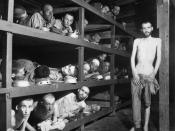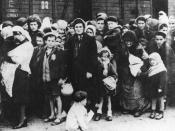Jan Gross' Neighbors emerged in 2001 Poland to nationwide "ignorance" of and nationalist "indifference" toward its relation of July 10, 1941 Poland's slaughter of 1,600 Jews in Jedwabne. The book was overlooked by the media as another attempt to implicate the Polish people in Nazi stirrings. Many argue now that an unbroken sociotemporal sin lies between the pre- and post-WWII generations, accounting for not only a Polish, but global bout of "inactivity" toward genocide-related thought, working against the triumphs of Israel's reinstallation, and, quite possibly, undoing a striking legacy of anti-genocidal reasoning.
It is dangerously ironic that 53 years removed from Jedwabne, at last, in late 1994, the very first prosecutions under the Genocide Convention (GC) were fashioned in the trials of Jean Kambanda: the consequent verdict in 1998 marking the first time an international court found individuals guilty of the crime of genocide. Social scientists approximate that besides Rwanda another 15 nations (all hitherto untried) have either attempted, or carried out genocide since 1948, a year in which, with the birth of the GC the UN apparently said "never again."
However international the body and thunderous the voice of which should sound, it seems that the fledgling shot at international rule added in a bureaucratic whisper, " ... should convenience permit," showing its susceptibility to the postmodernist worship of present struggle at the expense of faith in the historical tragedy and its lessons.
Such a neglected past marches the retrospective observer out of a brazenly suburban station toward overwhelming questions: Shall we, too, commit crimes against the collective consciousness by slaying memories of genocide, though they are innocent? How did memories of past atrocities become outmoded teachers? And can these memories, rightly directing our actions, salvage justice's future? Reforms toward answering these questions would involve a restoration of faith...


